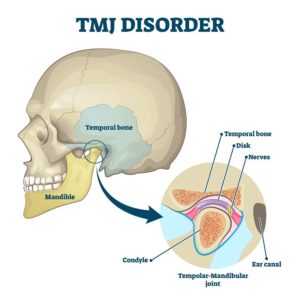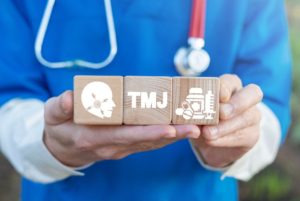TMJ Chiropractor
Do you wake up with your jaw feeling sore? Do you have trouble opening your mouth wide or hear a clicking sound when you chew? These could all be signs that you are dealing with a TMJ disorder. TMJ refers to the temporomandibular joint in your jaw and is what allows your jaw to open and close.
People tend to refer to TMJ disorders simply as “TMJ,” which can actually refer to a variety of issues that may affect you. Thankfully, a TMJ chiropractor can help with health conditions related to your jaw. Visit your Jonesboro chiropractor for TMJ if you are experiencing facial pain, tenderness, or difficulty moving your jaw. Here’s everything you need to know about TMJ disorders and how chiropractic for TMJ can help!
 What Is TMJ?
What Is TMJ?
The temporomandibular joint, commonly abbreviated as TMJ, connects your lower jaw, known as the mandible, to your skull. You have two temporomandibular joints, one on either side of your head, located just in front of your ears. This joint is what allows you to open and close your jaw. When your temporomandibular joint is working effectively, you should be able to talk, eat, yawn, and do other mouth-related movements without issue. If you have a health condition that affects your TMJ, then the joint may prevent you from doing these simple, daily actions effectively. Millions of Americans deal with TMJ disorders, which more commonly occur in women than men. While TMJ disorders can be treated, you need a chiropractor who can address the root cause in order to effectively diagnose and treat your TMJ issue.
Causes of TMJ Disorders
TMJ disorders can occur for a few reasons. In some cases, it may be difficult to pinpoint what exactly is causing your TMJ disorder and symptoms. Here are four common causes of TMJ disorders.
Stress
You might be surprised to learn that one of the most common causes of TMJ disorders is stress. When you experience an increase in stress and anxiety, you may experience physical signs and symptoms. Stress can cause you to clench or grind your teeth. You may not even realize you are clenching your teeth until you start to notice pain or other symptoms of a TMJ disorder. If you are stressed, you may be more likely to tense muscles in your upper body, causing you to raise your shoulders toward your ears. This can put stress and strain on your neck and affect your posture.
Poor Posture
Poor posture can also lead to TMJ pain and disorders that affect your jaw. If you spend long hours hunched over your computer or looking at your phone, you can develop “tech neck.” This hunched forward posture can put additional strain and stress on the muscles that support your head and neck. If the muscles and soft tissues that support your jaw and chin become weakened or tense, this can impact the healthy functioning of the temporomandibular joint.
Trauma
An injury to the face or jaw can also lead to TMJ disorders. If you have been injured in a car accident, while playing sports, or from a slip and fall, a blow to the face could impact the healthy functioning of your jaw. If the jaw is dislocated or damage occurs to supportive tissues nearby, you could experience pain and other symptoms. If left untreated, the pain from trauma to the jaw or head could also cause you to tense up and develop bad habits like grinding or clenching your teeth.
Teeth Grinding
 It is quite common for people to grind their teeth and not even realize they are doing it. Teeth grinding is especially common at night when you are unaware of what your body is doing while you sleep. When you grind your teeth, you are rubbing your top and bottom teeth against one another, often with much greater force than you realize. You may grind your teeth out of habit due to stress and anxiety or because it has become a habit. If you have hypermobility in your joints, this could cause you to grind your teeth without full awareness.
It is quite common for people to grind their teeth and not even realize they are doing it. Teeth grinding is especially common at night when you are unaware of what your body is doing while you sleep. When you grind your teeth, you are rubbing your top and bottom teeth against one another, often with much greater force than you realize. You may grind your teeth out of habit due to stress and anxiety or because it has become a habit. If you have hypermobility in your joints, this could cause you to grind your teeth without full awareness.
Teeth Clenching
Another common habit that can contribute to TMJ pain is clenching your teeth. While you may not rub your teeth together, you could tense and clench your jaw. The human jaw is actually very strong and powerful, so when you clench your teeth together, you are putting a significant amount of pressure on your temporomandibular joint and its supportive tissues. Both teeth grinding and clenching are known as bruxism, which can lead to jaw disorders and even damage your teeth.
Structural Issues
Structural issues with your jaw can also cause you to grind or clench your teeth. Some structural issues require additional support and intervention by a dentist or orthodontist. If your teeth are not properly aligned, you may have what is called malocclusion, or a “bad bite.” When your teeth are not properly in line with one another, it can cause you to unconsciously clench or grind your teeth. The upper and lower jaws must be aligned properly for your teeth to line up like they should. Otherwise, crooked teeth or a misaligned jaw can require orthodontics, braces, or even surgery.
Signs & Symptoms of TMJ Disorders
The signs and symptoms of a TMJ disorder may depend on what is causing your jaw issues. Here are common signs and symptoms of a TMJ disorder and how they can impact you.
Jaw Pain
The most common sign of a TMJ disorder is jaw pain. This pain can occur when you first wake up and may feel like your jaw is stiff or sore when you first open your mouth. You may also experience pain in your jaw when you talk or chew.
Headaches
When you tense your jaw or clench your teeth, this puts an immense amount of pressure on your facial structures. This type of tension can aggravate the muscles, tendons, and other soft tissues in your face and lead to headaches. TMJ-related headaches can frequently occur when you have a health condition that affects your jaw.
Reduced Mobility
You might also notice you have reduced mobility in your mouth and jaw. A TMJ disorder can make it more difficult for you to open your mouth wide. When you yawn or open your mouth to take a big bite of food, it can become painful or even feel impossible. TMJ disorders can make certain movements like chewing, talking, and opening your mouth more difficult.
Jaw Clicking
Issues with the temporomandibular joint can also cause your jaw to make clicking sounds. These sounds may occur when you are chewing, especially if you are eating harder foods that are more difficult to chew. This clicking or popping sound may also occur after you wake up and when you first talk or brush your teeth in the morning.
Neck Pain
The pain from a jaw disorder can also radiate into your neck. The muscles and tendons that connect your neck to your head can become stressed and strained when you have a jaw issue. Neck pain may feel like a dull, throbbing ache, and you may notice it after you have been sleeping and clenching or grinding your teeth at night.

How TMJ Disorders Get Diagnosed
There are so many variations of TMJ disorders, so you want to get an accurate diagnosis and find the root of the problem. In order to effectively diagnose a TMJ disorder, you may undergo a physical examination of your jaw, head, and neck. A TMJ chiropractor will look for any swelling or tenderness in and around the jaw area. They may also ask you to replicate certain movements with your mouth and jaw to listen for any clicking or popping sounds. Diagnostic imaging tests like X-rays can also help diagnose a TMJ disorder. Your dentist may be the first to notice with their X-rays that show the bite of your jaw and teeth placement from multiple angles. A TMJ chiropractor may also request X-rays to look at the structure of your jaw joint. CT scans or an MRI can also provide greater detail about what is going on inside and around the temporomandibular joint. Both of these more advanced diagnostic scans show detailed images of bones, joints, and soft tissues like muscles, tendons, organs, and other nearby structures.
Chiropractic Care for TMJ
Once your TMJ chiropractor has determined the most appropriate diagnosis for your TMJ pain, they can get started on a treatment plan to help relieve your symptoms and address the root cause. Here is what you can expect when you visit a chiropractor for TMJ treatment.
Manage Facial Pain
Your Jonesboro TMJ chiropractor will provide you with effective solutions for managing and relieving your facial pain. Chiropractors use natural and drug-free treatment techniques to help with pain and discomfort. Chiropractic care involves both addressing your symptoms and getting at their source. By addressing the source of your pain, you can experience long-lasting pain relief. A chiropractor may also use therapeutic massage and other techniques to reduce pain and discomfort in and around your jaw area.
Adjust Jaw Alignment
When your temporomandibular joint is out of proper alignment, it can lead to all kinds of joint pain and other symptoms. A chiropractic TMJ adjustment will involve gently and safely manipulating the jaw joint so that it returns to its proper alignment. By adjusting your jaw alignment with a TMJ chiropractor, you can experience long-term results for a wide range of jaw issues. Your TMJ chiropractor may also walk you through stretches and exercises to help support the healthy and proper alignment of your jaws.
Strengthen Jaw Muscles
When you have issues with the temporomandibular joint on either or both sides of your face, the surrounding muscles can become tense or weakened. A TMJ treatment chiropractor can also help restore healthy functioning in these supportive muscles and tissues. Soft tissue mobilization can help provide your jaw joint with the support it needs to function properly. By strengthening the muscles in and around your jaw joints, you can also practice better posture overall.
Restore Joint Mobility
TMJ disorders can impact your ability to move your jaw in simple and important ways, like chewing and talking. Talk to your Jonesboro chiropractor if you experience any issues with joint mobility in your jaw, along with other symptoms. In addition to TMJ adjustments, your chiropractor may also recommend certain stretches and exercises to help your jaw open more effectively and without pain. Maintaining or restoring proper alignment to your temporomandibular joint can help you experience proper and long-lasting range of motion for those important, everyday movements.
Promote Jaw Healing
If you have suffered an injury to the face or jaw, then your TMJ chiropractor can also work with you to promote healing in the area. Chiropractic adjustments and soft tissue mobilization will help restore healthy functioning naturally. These chiropractic techniques will also help improve healthy circulation so that your jaw and other damaged areas receive effective circulation with oxygen and nutrients that promote healing and healthy functioning. By removing excessive pressure on your jaw, you will be able to eat, chew, talk, and yawn without pain or other uncomfortable symptoms.
If you are searching for a “TMJ chiropractor near me,” look no further than AICA Orthopedics in Jonesboro. Our team of chiropractors provides natural and effective solutions for managing and relieving symptoms associated with TMJ disorders. Your Jonesboro chiropractor will work with you through your first visit, diagnosis, and TMJ treatment to ensure you experience quality and comprehensive care. Our chiropractors offer personalized treatment plans that address your specific symptoms and the root cause of your TMJ disorder. Learn more about proper jaw alignment and ways to reduce your risk of future issues with TMJ pain and disorders when you work with our pain and jaw specialists at AICA Orthopedics in Jonesboro. Call or visit us online today to schedule an appointment and get started with a Jonesboro TMJ chiropractor today!
